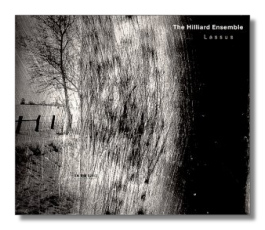
The Internet's Premier Classical Music Source
Related Links
- Lassus Reviews
- Latest Reviews
- More Reviews
-
By Composer
-
Collections
DVD & Blu-ray
Books
Concert Reviews
Articles/Interviews
Software
Audio
Search Amazon
Recommended Links
Site News
 CD Review
CD Review
Orlando di Lasso

Requiem
- Missa pro defunctis
- Prophetiae Sibyllarum
The Hilliard Ensemble
(David James, countertenor
Rogers Covey-Crump & John Potter, tenors
Gordon Jones, baritone)
ECM New Series 1658 453841-2 DDD 63:15
We know relatively little about Orlando di Lasso, who was in born in 1532 and died in 1594. Lassus, the Latinized version of his name, is how his contemporaries came to know him. We do know that, like many musicians, he was a bit of a rebel when he was young. When he was older, he put his rebellious ways aside, although whether his motivation was practical or internally motivated is not clear.
His rebelliousness manifested itself in the chromatic adventurousness of his writing. In the opening movement of Prophetiae Sibyllarum (Prophecies of the Sibyls), Lassus subverts any sense of a tonal center by voyaging through chords based on eleven of the twelve chromatic semitones - all within the first eight measures! It is probable that Lassus was trying to mirror the mystic and practically pagan subject matter with music that was equally wild and strange. The entire Prophetiae Sibyllarum is one of those ancient works whose language is so unusual, so unfettered by the rules that we gradually came to accept throughout the maturation of Western art music, that many listeners could easily mistake it for a work from this century. It is difficult to appreciate it, but only in an intellectual sense - as pure sensation, it is loveable.
The Missa pro defunctis (Mass for the dead) is a later and more traditional work. Nevertheless, it has its unusual features. The Dies irae is omitted; instead, it is replaced by a Graduale: "If I walk in the shadow of death, I will fear no ill; for you are with me, O Lord. Your rod and staff comfort me." The "walking" is described musically with measured but intensely emotional vocal lines. This eerily beautiful Graduale is the highlight of the Mass, and it is reason enough to hear this disc.
It's an overused word, but the music of Lassus is "awesome" in the most literal sense, and so are the performances of the Hilliard Ensemble. Their intonation and control are flawless, and it is obvious that tremendous concentration and musicianship went into the making of this recording. It was taped in 1993, and it is curious that it is being released only now - I think it is one of their finest achievements.
Copyright © 1999, Raymond Tuttle


















